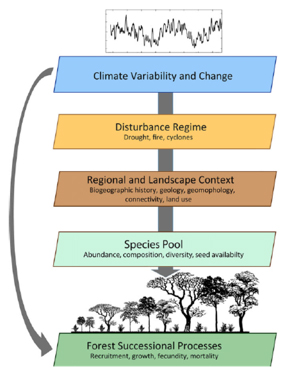How will Climate Change Influence Forest Recovery
Uriarte, M., N. Schwartz, J. S. Powers, E. Marín‐Spiotta, W. Liao, and L. K. Werden. 2016. Impacts of climate variability on tree demography in second growth tropical forests: the importance of regional context for predicting successional trajectories. Biotropica 48:780-797.
Climate change is upon us, and the impacts of climate change and climate variability on large-scale forest regeneration cannot be ignored. Climate change is linked to increased likelihood of large-scale fires, intense tropical storms, and outbreaks of forest pests and diseases. Tropical regions are predicted to experience extreme seasonal heat and shifts in precipitation patterns. Further, land-use change may exacerbate the effects of climate change.
 In this review of 112 studies, the authors summarize information on how natural climate variability affects the demography and dynamics of second-growth forests to gain insights into how future climate change may influence recovery trajectories. These effects can directly influence tree demography but can also be indirectly mediated by the species pool of regrowing forests through effects on disturbance regimes in relation to biogeographic context and patterns of land-use/land-cover (see figure).
In this review of 112 studies, the authors summarize information on how natural climate variability affects the demography and dynamics of second-growth forests to gain insights into how future climate change may influence recovery trajectories. These effects can directly influence tree demography but can also be indirectly mediated by the species pool of regrowing forests through effects on disturbance regimes in relation to biogeographic context and patterns of land-use/land-cover (see figure).
Many studies show that drought decreases tree growth, survival, and recruitment, particularly during early stages of forest succession. Effects of temperature are less explored. Fires and cyclonic storms often lead to positive feedbacks, increasing vulnerability to climate extremes and the disturbances they create. In geographic regions with a history of long-term exposure to climate extremes, however, such events can lead to local adaptations that increase resilience. Fragmentation increases the vulnerability of forests to fire, wind, and drought; whereas increasing human activities in landscapes increase the frequency and use of fire. These interacting factors can potentially retard succession and restoration efforts.
The study revealed major gaps in understanding how climate change will impact forest recovery, with major implications for forest and landscape restoration. Most studies have been conducted in the Neotropics, suggesting a need to expand this research into Asia and Africa. Comparative studies of climate effects across biogeographic regions are urgently needed. Knowledge of how climate variability and change will influence outcomes of forest and landscape restoration should be actively incorporated into planning and practice.
The PARTNERS connection
This review emerged from a working group discussion during the first PARTNERS workshop in 2014 and a follow-up workshop sponsored by PARTNERS at Columbia University in 2015. The paper was published as a contribution to the Special Issue of Biotropica.


